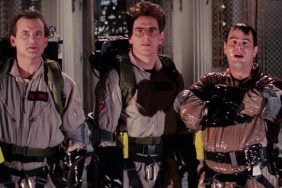
Live long enough and you’re bound to find something that inspires you. For the critics at Crave, it’s movies, which have their own subgenre dedicated entirely to flicks that make you want to get out of your seat and do something with your life.
But what is The Best Inspirational Movie Ever? We asked Crave’s critics to each pick the one film (and they can only choose one) that represents the epitome of the inspirational movie genre, just to see what the heck these distinctive minds would come up with.
So scroll down to read the picks from William Bibbiani, Witney Seibold and Brian Formo and let us know what film inspires you the most! And of course come back next week for an all-new installment of Crave’s highly debatable ongoing series, The Best Movie Ever.
Witney Seibold’s Pick: It’s a Wonderful Life (1946)

There are many movies that I consider to be “inspiring” that may not fit so comfortably into the the trappings of the sketchily defined genre. I’ve always drawn a great deal of inspiration from Akira Kurosawa’s Ikiru, a film about a salaryman who learns to do a single small simple thing with his life before stomach cancer takes care of him. But that film is perhaps too maudlin to be considered an “inspirational” film, and its triumphs come with a quiet rush rather than with a great inspiring explosion.
No, for “inspirational” movies, I have to turn to the master of Hollywood optimism, the great Frank Capra. Capra is perhaps – and I don’t exaggerate here – one of America’s great modern philosophers (and yes, I know he’s actually Italian). Capra’s films espouse a powerful philosophy of the practical uses for – and ultimate triumph of – hope, compassion, forgiveness, and gentleness. And while the film may be his bleakest (it’s ultimately largely about suicide and despair), Capra’s most inspiring film is easily his well-played Christmas classic It’s a Wonderful Life. The story has been well-worn and re-used numerous times in proceeding TV specials, so I won’t reiterate it here, other than to say it’s become part of modern American lore. A man is at the end of his rope, and an angel intervenes. He will learn that, well, it’s a wonderful life.
One cannot be inspired unless one sees that life is beleaguered, and in George Bailey, he have someone at the end of his rope. Even when faced with an honest-to-goodness angel, George is still withdrawn and cynical. It’s a Wonderful Life is about shedding cynicism and finding hope. Capra took a tale that was essentially pioneered by Charles Dickens (it carries echoes of A Christmas Carol), and made it feel more emotionally immediate, infusing it with his very real personal life view. Many movies pay lip service to hope and joy. Capra meant it.
William Bibbiani’s Pick: Rocky (1976)

My first instinct, when trying to decide on the best inspirational movie ever, was to go with another recent pick on Best Movie Ever: Rudy, the feel-good tale of a scrawny pipsqueak who tried so danged hard for so danged long he finally got to play for Notre Dame. But while I’m perfectly willing to admit that Rudy is the best tearjerker, period, I came to decide that the film doesn’t so much inspire me as freak me the hell out. There’s something almost pathological about Rudy’s need to play football, a somewhat unwholesome obsession that makes for a great story but probably shouldn’t be encouraged in everybody watching it at home.
But Rocky? That’s another story. Sylvester Stallone wrote and starred in this tale of a washed out palooka who chances into a shot at greatness – a bicentennial bout with heavyweight champion Apollo Creed (Carl Weathers) – by sheer, dumb luck. (Rocky happens to have a cool name; literally, that’s it.) I can’t find myself inspire by Rudy’s lifelong obsession because I will never share it, but I can be inspired by a working stiff who gets a rare opportunity to do something great, and who works really, really hard and ultimately rises to the challenge.
So many profound words have been written about Rocky that writing about it once again feels redundant, and picking it feels like a little cheap. Of course Rocky is inspirational, after all. It’s Rocky. But some classics are classics for a reason, and John G. Avildsen’s down home direction, Stallone’s own rags to riches backstory, and a slew of impressive performances turn the actor’s clever and touching screenplay into something truly magical that stands the test of time. It’s a film for everybody who thinks they just need one more chance to find their greatness, and it’s a film that says that even if you fail, you can become a better person for trying. That’s a real inspiration to me.
Brian Formo’s Pick: Do the Right Thing (1989)

A truly inspirational movie doesn’t just follow the path of an underdog overcoming adversity and winning. Something that simple might make us feel good, but most likely it doesn’t linger—or challenge you with difficult questions. An inspirational movie should present something difficult, and ask you, the viewer, to talk about complex situations that can’t be so easily labeled as “right” and “wrong.”
Spike Lee’s Do the Right Thing begins unlike any other film: a sweaty shadowboxer (Rosie Perez) dances and punches to a modern, angry anthem (Public Enemy’s “Fight the Power”). Her movements are dual – attuned violence and carefree playfulness – and Perez vacillates between both states with ease. So does the film. Lee uses a hot day as a metaphor for racial tension in a predominantly black neighborhood with a white-owned pizza shop on the corner where everyone seems to be at one point of the day. The mood vacillates with the heat: highs and lows. Eventually the tension boils over.
The final 20 minutes are some of the most devastating—and confusing—moments in American cinema. Because Lee titles his film Do the Right Thing and because Lee plays a young man who engages in a riot after a horrific, preventable death, many viewers get hung up on what “the right thing” is. Lee is smart to not present answers. Within one action, certain aspects can be right and certain aspects can be wrong, but perhaps a healthy combination is what is necessary for change. He ends the film with a quote from Malcolm X and a quote from Martin Luther King, divergent leaders of thought on race relations in America. A mixture of both might be necessary: just like Perez’s dance/fight.
The fact that Lee’s film can still be spliced with police malpractice against black American youths only inspires more desire for change, and more action in the streets. It continues to inspire because “the right thing” has still not been achieved.








